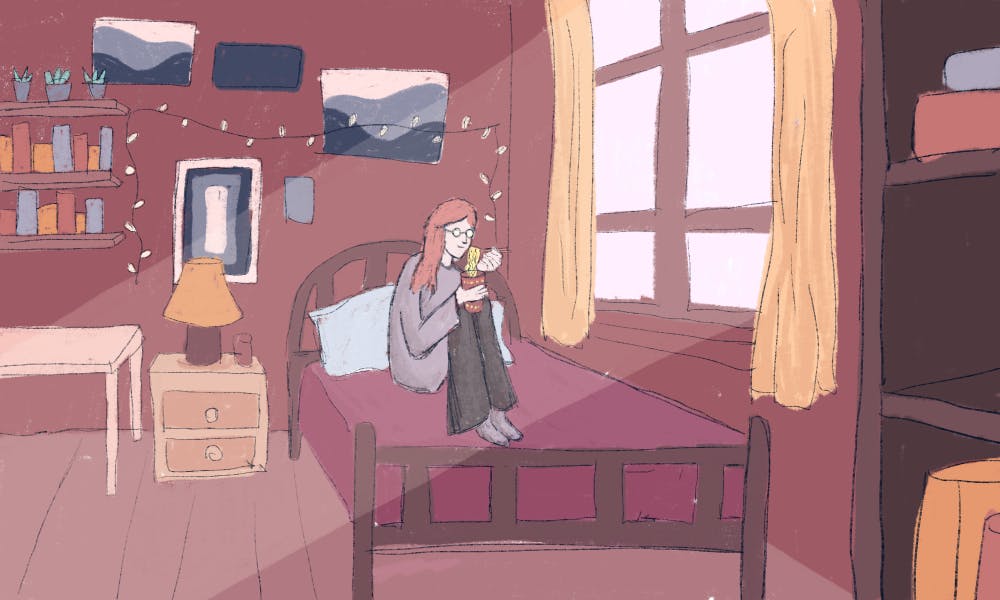
Penn students talk a lot about various aspects of our campus culture and the negative effects that accompany them. We all know how our pre-professional culture creates stress among students and negatively impacts our mental health; we frequently talk about flashy displays of wealth and the insular, out-of-touch environment that we have here, so much so that terms like “Penn bubble” or “SABSing“ have become shorthand and memes. But many negative parts of Penn are harder to talk about — and one of them is the fact that a lot of us feel lonely, and we aren’t sure what to do about it.
Admitting that we feel alone can be scary, but we absolutely have to. I felt incredibly isolated when I came to Penn, and honestly, I still frequently do. Loneliness wreaked havoc on my mental health, my existing relationships, and my self esteem — until I learned to stop being ashamed of it.
Loneliness in college is not a Penn-exclusive phenomenon and it’s not necessarily new. As long as people have been going away to school, students have struggled in their new environments. But things do seem to have gotten worse. Adults like New York Times columnist Frank Bruni, who graduated from college in 1986, write op-eds about how students experience loneliness in college today. Bruni expressed concern that “more than 60 percent” of college students “said that they had 'felt very lonely’ in the previous 12 months,” and that “nearly 30 percent said that they had felt that way in the previous two weeks.” Schools like the University of Southern California have increased support resources, blaming social media for the rise of a "loneliness epidemic." Viral videos and even DP columns that talk about the experience of being a lonely college freshman are popular when they do appear; all too often though, we treat these stories like Band-Aids. It makes us feel momentarily better to hear other people talk, but we often don’t open up or challenge the underlying forces driving the way we feel.

I understand what it’s like to feel alone and simultaneously embarrassed of feeling that way. In a lot of ways, the shame that comes with feeling cut off from your peers is worse than just being alone. During my freshman year, I would sit alone — in the dining hall, in my room — and compare myself to the loud groups laughing and eating together, the girls in communal bathrooms getting ready to go out together, and the absolutely endless stream of students on Instagram and Snapchat declaring their love for their newfound best friends. I didn’t feel close to anyone at Penn in that way, and I was convinced there was something wrong with me, that some deficiency closed me off from everyone else and kept me from having what they had. I was ashamed of feeling lonely, so I didn’t talk to anyone about it. Then, not being able to talk to anyone made me feel even worse, and the cycle pulled me further and further away from chances to connect with others.
Looking back, the way I felt was driven by being in an environment like Penn for the first time. So many of the problems with Penn feed into isolation — the culture of competition teaches us to view all of our relationships as either transactional or combative, which makes it harder to form genuine and close bonds. Our low socioeconomic and geographic diversity made me, a fairly privileged kid from a small town in the Midwest, still feel like the odd one out, and I know that effect has to be even stronger for groups like FGLI students. It’s important to acknowledge that there are larger issues driving the isolation that many students feel, and we can’t fix those cultural issues quickly or easily. What we can do, though, is be honest about the loneliness we feel, talk about it openly, and refuse to be ashamed of it.
In the non–fiction book The Lonely City, which served as crucial reading for me when I was at my lowest, Olivia Laing writes: “I don't believe the cure for loneliness is meeting someone … I think it's about two things: learning how to befriend yourself and understanding that many of the things that seem to afflict us as individuals are in fact a result of larger forces of stigma and exclusion, which can and should be resisted.”
As far as I’ve come, I haven’t stopped wishing for more friendships and closer bonds here at Penn. But I have learned to stop blaming myself when I feel alone in this strange, artificial, and challenging environment; and, in the process, I’ve learned that I want this place to be better. If you feel lonely at Penn, please: Stop feeling like you have to hide it. Not only will it be better for you, but when more of us open up and talk about why we feel the way we feel, we can start to work towards fixing it.

ANA WEST is a College sophomore from Spring Lake, Mich. studying English. Her email address is anawest@sas.upenn.edu.
The Daily Pennsylvanian is an independent, student-run newspaper. Please consider making a donation to support the coverage that shapes the University. Your generosity ensures a future of strong journalism at Penn.
Donate




